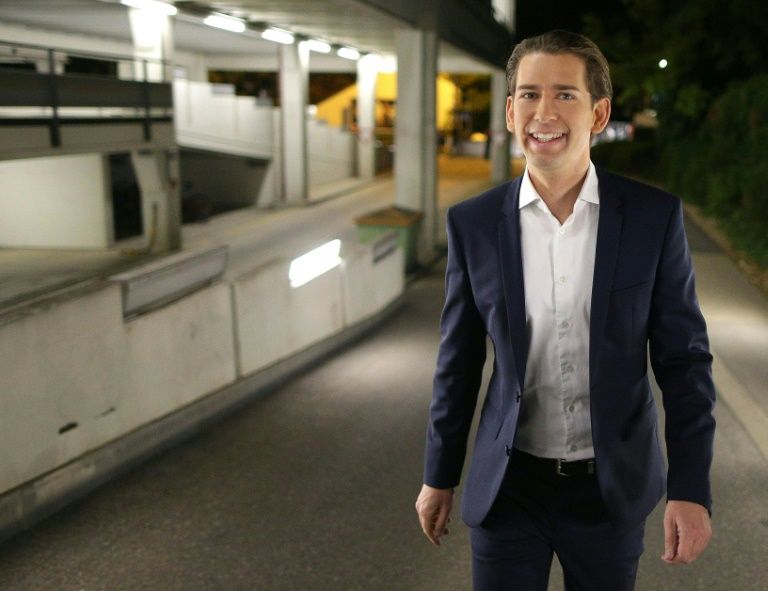Austrian 'whizz-kid' projected to triumph in election

VIENNA: Austria´s political "whizz-kid" Sebastian Kurz, 31, looked on course Sunday to become Europe´s youngest leader, likely in coalition with the far-right after his conservative party was projected to come first in elections.
Projections put Kurz´s People´s Party (OeVP) on 30.2 percent, followed by the far-right Freedom Party (FPOe) on 26.8 percent and incumbent Chancellor Christian Kern´s Social Democrats (SPOe) on 26.3 percent.
Kurz, nicknamed "wunderwuzzi", is expected to form a coalition with the anti-immigration FPOe of Heinz-Christian Strache, 48.
It would be the first time it has entered government since 2000 under Joerg Haider.
Another option for Kurz would be another "grand coalition" with the SPOe, but after 10 acrimonious years governing together -- ended early by Kurz in May — this is seen as less likely.
The FPOe´s return to power in the wealthy EU member would be a fresh headache for Brussels as it struggles with Brexit and the rise of nationalists in Germany, Hungary, Poland and elsewhere.
Like the Alternative for Germany, which last month became the third-largest party in the Bundestag, and France´s National Front, the FPOe has stoked concerns about a record influx of migrants into Europe.
The party was founded by ex-Nazis in the 1950s -- Strache flirted with neo-Nazism in his youth -- and is highly critical of the European Union. It wants EU sanctions on Russia lifted.
In December, the FPOe almost won the presidency and topped opinion polls in the midst of Europe´s migrant crisis.
But since taking over the OeVP in May and re-branding it as his personal "movement", Kurz has stolen some of Strache´s thunder by talking tough on immigration and criticising the European Union as well.
'Crossroads'
Meanwhile, the once-mighty SPOe looked set to be relegated to the opposition after their campaign suffered blunders and scandals.
Open dislike between ex-railway chief Kern, 51, who gave his party fresh hope when he became chancellor in May 2016, and Kurz also makes any new attempt at ruling together seem unlikely.
But for some voters, the prospect of a far-right alliance is problematic.
"I´m not sure that we really need big changes," Tina Ernest told AFP at a Vienna polling station Sunday.
"I would say that in Austria we still live in paradise."
Kern, in office since last May, issued a final warning Saturday against a right-wing alliance, saying "Austria was at the most important crossroads in decades".
The OeVP and FPOe already shared power between 2000 and 2007. At the time the alliance with the far-right -- then led by the late, SS-admiring Haider -- ostracised Austria.
But there would not be the same backlash now owing to the "normalisation of the far-right in Europe since then," said expert Pepijn Bergsen at the Economist Intelligence Unit.
'Austria first'
Some 6.4 million people were eligible to vote in the closely-watched ballot which is expected to be a tight race.
"I´m feeling optimistic," OeVP party volunteer Michael Brandstetter told AFP in Vienna ahead of the vote.
"The way Kurz goes about things is what has captured people´s minds".
For his turquoise movement, Kurz drew young candidates from outside politics and vowed to put "Austrians first" again.
As foreign minister, Kurz claims credit for closing the Balkan migrant trail in 2016, earning him praise at home.
Pushing far-right themes, he wants to cut benefits for all foreigners, slash Austria´s red tape and keep the EU out of national affairs -- in common with Strache.
Experts say a right-wing government could turn Austria into a tricky partner for the bloc.
Vienna will hold the EU´s presidency in the second half of 2018, just when Brussels wants to conclude Brexit talks.
"The Freedom Party as a government partner will not make a good impression in Europe (and) Kurz is aware of that," commented Der Standard newspaper in its weekend edition.
"But the question is whether there is any getting around Strache after this election."
Comments
Post a Comment